人教版(2019)必修 第二册 Unit 5 Music Discovering Useful Structures 分词作状语 课件(共49张PPT)
文档属性
| 名称 | 人教版(2019)必修 第二册 Unit 5 Music Discovering Useful Structures 分词作状语 课件(共49张PPT) | 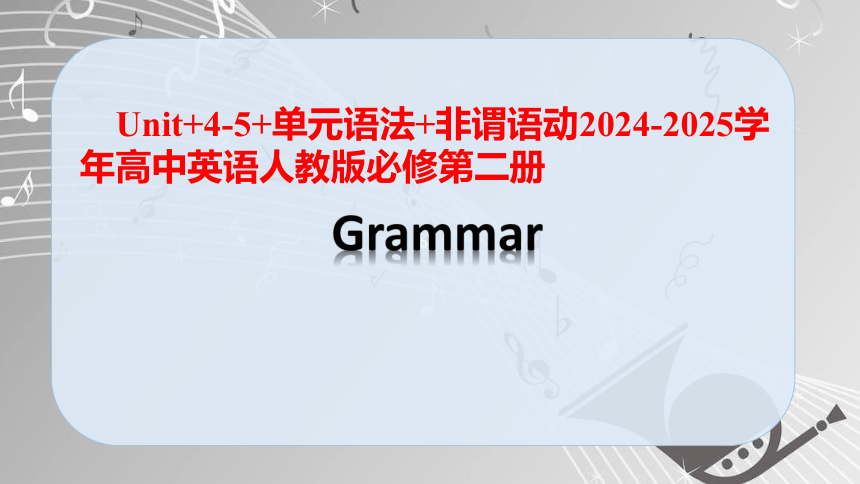 | |
| 格式 | pptx | ||
| 文件大小 | 1.6MB | ||
| 资源类型 | 教案 | ||
| 版本资源 | 人教版(2019) | ||
| 科目 | 英语 | ||
| 更新时间 | 2024-08-24 15:10:38 | ||
图片预览

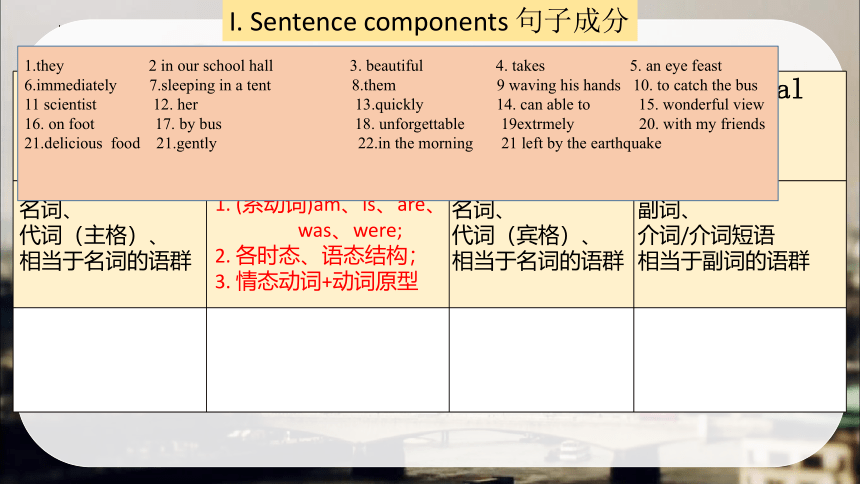
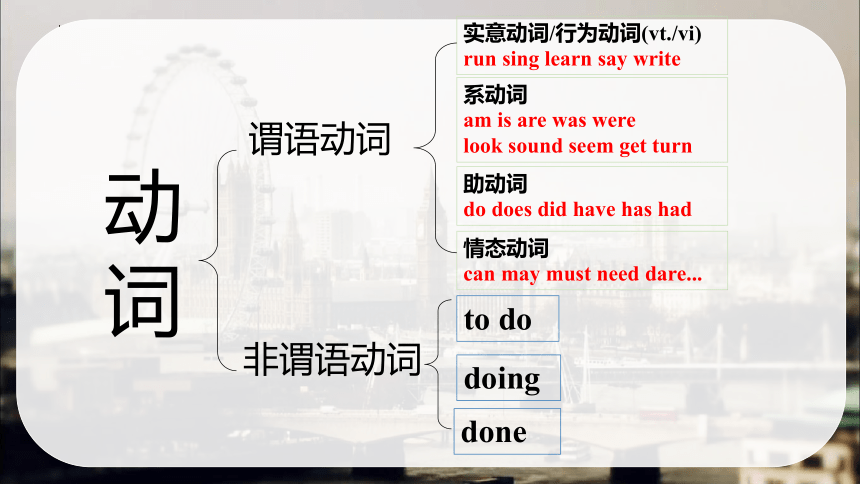
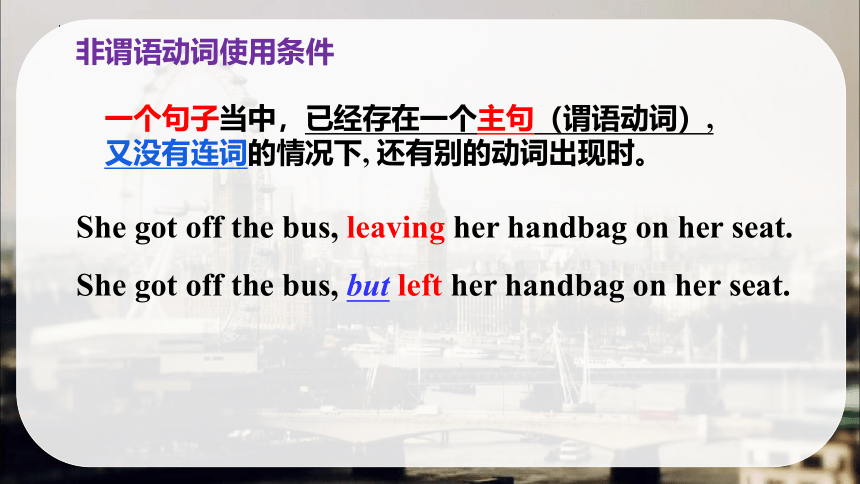

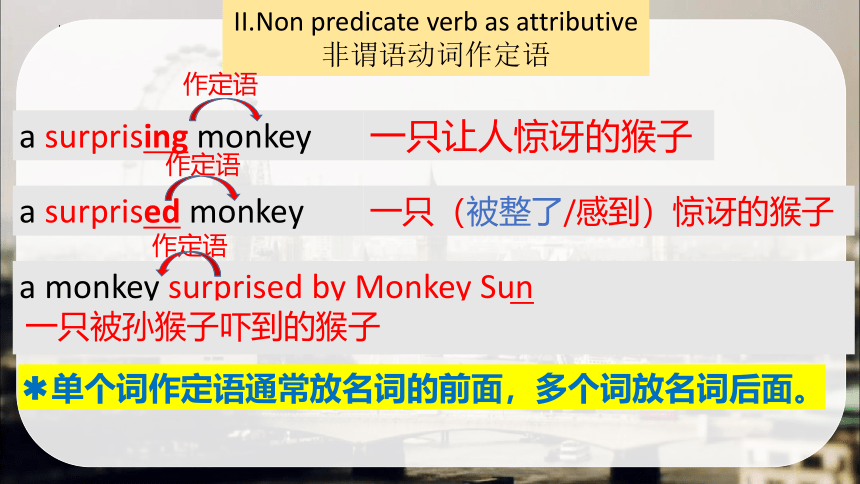
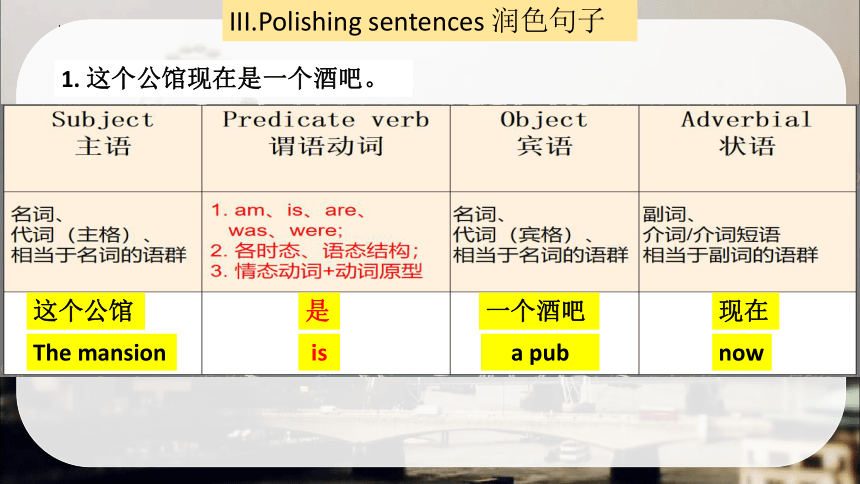
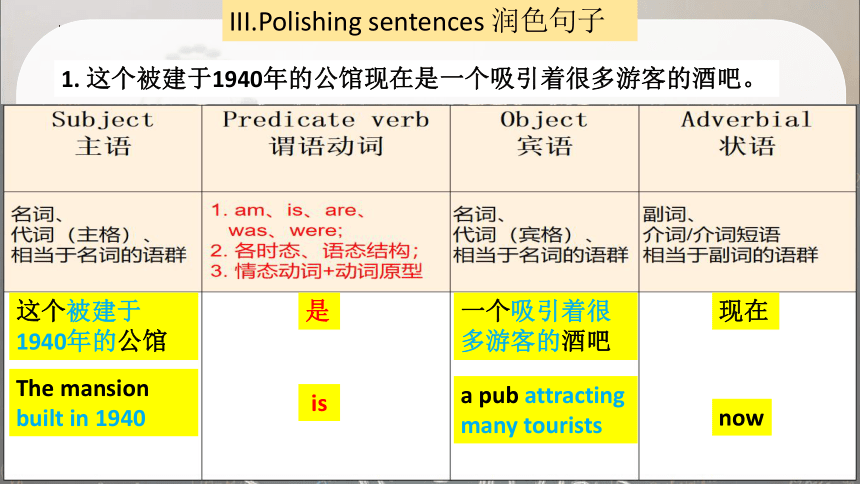


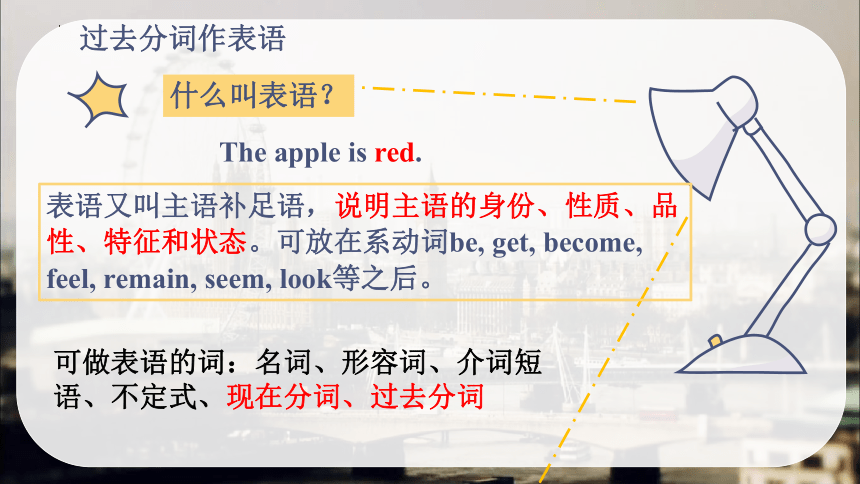
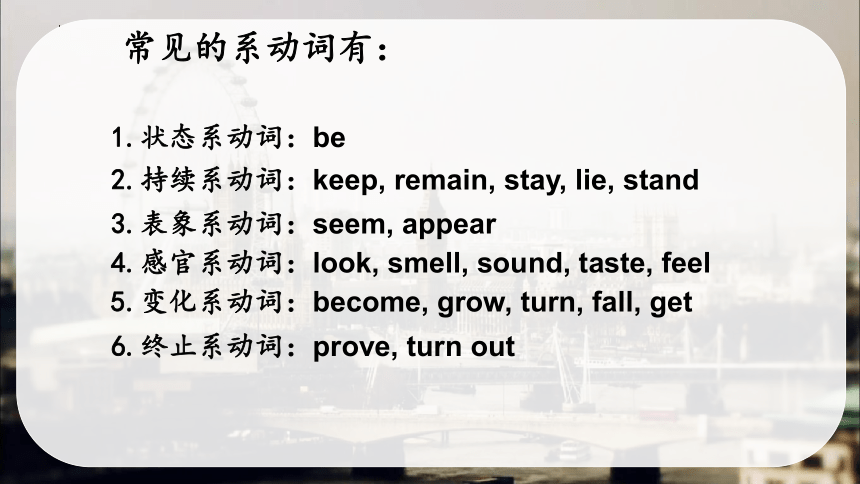
文档简介
(共49张PPT)
b
Grammar
Unit+4-5+单元语法+非谓语动2024-2025学年高中英语人教版必修第二册
I. Sentence components 句子成分
Subject 主语 Predicate verb 谓语动词 Object 宾语 Adverbial
状语
名词、
代词(主格)、
相当于名词的语群
名词、
代词(宾格)、
相当于名词的语群
1. (系动词)am、is、are、
was、were;
2. 各时态、语态结构;
3. 情态动词+动词原型
副词、
介词/介词短语
相当于副词的语群
1.they 2 in our school hall 3. beautiful 4. takes 5. an eye feast
6.immediately 7.sleeping in a tent 8.them 9 waving his hands 10. to catch the bus
11 scientist 12. her 13.quickly 14. can able to 15. wonderful view
16. on foot 17. by bus 18. unforgettable 19extrmely 20. with my friends
21.delicious food 21.gently 22.in the morning 21 left by the earthquake
动
词
谓语动词
非谓语动词
系动词
am is are was were
look sound seem get turn
实意动词/行为动词(vt./vi)
run sing learn say write
助动词
do does did have has had
情态动词
can may must need dare...
to do
doing
done
非谓语动词使用条件
一个句子当中,已经存在一个主句(谓语动词),又没有连词的情况下, 还有别的动词出现时。
She got off the bus, leaving her handbag on her seat.
She got off the bus, but left her handbag on her seat.
分词
定语
宾语补足语
表语
状语
分词是非谓语动词的一种形式。兼有动词、形容词或副词的特性,可在句中充当定语、宾语补足语、表语或者状语。过去分词通常于逻辑主语之间存在被动关系或表完成。现在分词通常跟逻辑主语之间存在主动关系或表进行;
II.Non predicate verb as attributive 非谓语动词作定语
a surprising monkey
一只让人惊讶的猴子
a surprised monkey
一只(被整了/感到)惊讶的猴子
a monkey surprised by Monkey Sun
作定语
作定语
作定语
单个词作定语通常放名词的前面,多个词放名词后面。
一只被孙猴子吓到的猴子
III.Polishing sentences 润色句子
1. 这个公馆现在是一个酒吧。
这个公馆
是
一个酒吧
现在
The mansion
is
a pub
now
III.Polishing sentences 润色句子
1. 这个被建于1940年的公馆现在是一个吸引着很多游客的酒吧。
这个被建于1940年的公馆
是
一个吸引着很多游客的酒吧
现在
is
now
The mansion built in 1940
a pub attracting many tourists
二、过去分词做宾语补足语
1.过去分词用于感官动词feel,hear,listen to,have,make,let, see,notice,observe,watch等词之后做宾语补足语。
When we got to school,we saw the door locked.当我们到达学校时,我们看见门锁着。
2.过去分词用于使役动词have,make,get,leave,keep之后做宾语补足语。
Keep your mouth shut and your eyes open.
少说多看。
He had his money stolen.
他的钱被偷了。
I had my bike broken on my way home.
在我回家的路上,我的自行车坏了。
过去分词作表语
什么叫表语?
表语又叫主语补足语,说明主语的身份、性质、品性、特征和状态。可放在系动词be, get, become, feel, remain, seem, look等之后。
可做表语的词:名词、形容词、介词短语、不定式、现在分词、过去分词
The apple is red.
常见的系动词有:
状态系动词:be
2.持续系动词:keep, remain, stay, lie, stand
3.表象系动词:seem, appear
4.感官系动词:look, smell, sound, taste, feel
5.变化系动词:become, grow, turn, fall, get
6.终止系动词:prove, turn out
一、 过去分词做表语的含义
基本结构:用在系动词后面,构成系表结构,说明的是主语的状态,其作用相当于adj.
All the windows are broken.
All hope is gone.
This article is well written.
He appeared more satisfied with my work.
现在分词和过去分词作表语的区别:
过去分词作表语一般形容人,“感到…的”
现在分词作表语一般形容物,“令人…的”
1. We are ____________(interest) in the film.
The film is ____________ (interest) to us.
2. Michelle sounded __________(excite) to hear the news.
The news sounded ____________(excite).
interested
interesting
excited
exciting
常见的过去分词作表语(由情绪类动词转变)
interested; surprised; astonished(感到吃惊的); amazed; shocked; frightened; terrified(感到恐惧的); scared; delighted (感到高兴的); pleased; amused (感到开心的); disappointed; worried; tired; bored;puzzled; satisfied (满意的); depressed (感到消沉的); upset; disturbed(感到不安的); confused; inspired; encouraged, frustrated(感到沮丧的); embarrassed
_______ (move) by what I said, she stood
there for a moment.
感我此言良久立 (白居易 《琵琶行》)
_______ (give) the talent by the heaven,
I will employ it!
天生我材必有用 (李白 《将进酒》)
Enjoy some beautiful sentences
Moved
Given
过去分词作状语
什么叫状语?
状语修饰动词、形容词、副词或全句,说明方式、条件、时间、地点、让步、程度、目的、伴随等
I play soccer very well.
In the classroom, the boy needs a pen.
To see the beauty of the city, I go to the top of the mountain.
过去分词作状语
1. Born in the USA on 2 January 1970, Whitacre began studying music at the University of Nevada in 1988.
2. Moved by Mozart’s music, he said, “It was like seeing color for the first time.”
3. Inspired, he asked his fans to make videos.
找出下列句子的逻辑主语、非谓语并判断主语及非谓语之间的关系
把下列句子写成两个简单句
1. Born in the USA on 2 January 1970, Whitacre began studying music at the University of Nevada in 1988.
Whitacre was born in the USA on 2 January 1970.
Whitacre began studying music at the University of Nevada in 1988.
2. Moved by Mozart’s music, he said, “It was like seeing color for the first time.”
He was moved by Mozart’s music.
He said, “It was like seeing color for the first time.”
3. Inspired, he asked his fans to make videos.
He was inspired.
He asked his fans to make videos.
过去分词作状语的条件:
过去分词逻辑主语与句子主语一致
过去分词和逻辑主语是被动的关系(有时候固定搭配不表被动,表主语的状态)
Eg: Dressed in white, she looks more beautiful.
常见的固定搭配: be lost (迷路); be lost in (沉迷); be seated (坐);
be born (出生于); be dressed in (穿着);be interested in(感兴趣);
be tired of (厌烦);be worried about (担心);be absorbed in…
非谓语作状语的步骤:
判断出所给动词在句中作非谓语;
找出所给动词的逻辑主语;
考虑逻辑主语和所给词的关系,如果是主动关系,用doing;如果是被动关系,用done
1. _______ (see) from the hill, you will find the city looks like a big garden.
2. _______ (see) from the hill, the city looks
like a big garden.
Seeing
Seen
Seen
Given
Done
用所给词的适当形式填空。
1. _______ (see) from the hill, the city looks
like a big garden.
2. ______(give) more time, I will finish my work on time.
3. _____ (do) in a hurry, his homework was full of mistakes.
4. _____(leave) at home, John didn’t feel afraid at all.
5. The old man entered the meeting room, ________(support) by a young fellow.
6. _______ (see) from the hill, you will find the city looks like a big garden.
Left
supported
Seeing
Attention
与完整的状语从句相比,省略主语的过去分词(短语)在表达上更为简洁和凝练,是一种较高级的语言组织方式,同时突出了句子的表达重心,在正式文体中使用较多。
Activity 5 Complete the sentences using the correct form of the giving words.
__________ ( know ) as a language expert , Mr. Higgins was proud.
__________ ( know ) lots of languages, Mr. Higgins was proud.
主语Mr. Higgins与动词know是被动关系
主语Mr. Higgins与动词know是主动关系
Knowing
Known
Summary 4:
句子主语与分词存在逻辑上的被动关系,用 _______________ ;
句子主语与分词存在逻辑上的主动关系,用 _______________ 。
现在分词 V-ed
过去分词 V-ing
分词作状语时
V-ing vs V-ed
as adverbial
Discuss and Share
过去分词作状语
类型
_______状语
_______状语
_______状语
_______状语
___________状语
特点
过去分词与其逻辑主语之间是_____关系
过去分词的逻辑主语和句子主语保持 _____
Sum-up
时间
让步
条件
原因
方式和伴随
被动
一致
( 连词 + ) 状语从句
and连接的并列句
分词作状语记忆口诀
分词作状语,主语是问题。
前后两动作,共用一主语。
主语找出后,再来判关系。
主动用-ing,被动用-ed。
过去分词(短语)与主句的主语之间存在逻辑上的被动关系;现在分词(短语)与主句的主语之间存在逻辑上的主动关系。
1. When he was told that he passed the exam, he was very excited.
Told that he passed the exam, he was very excited.
2. When it is seen under a microscope, a fresh snowflake has a delicate six-pointed.
Seen under a microscope, a fresh snowflake has a delicate six-pointed shape.
1.时间状语 相当于as, when, while,until等引导的时间状语从句。其逻辑主语为句子的主语,两者之间为被动关系,该动作通常表示先于谓语动作发生或同时发生。
1. Since/As she was given advice by the famous detective, the young lady was no longer afraid.
Given advice by the famous detective, the young lady was no longer afraid.
2. Because it was done in a hurry, his homework was full of mistakes.
Done in a hurry, his homework was full of mistakes.
2.原因状语 相当于as, because等引导的原因状语从句。其逻辑主语为句子的主语,两者之间为被动关系。
1. If they had been given more attention, the cabbages could have grown better.
Given more attention, the cabbages could have grown better.
2. If I am compared with you, we still have a long way to go.
Compared with you, we still have a long way to go.
3.条件状语 相当于if, unless, once等引导的条件从句。其逻辑主语为句子的主语,两者之间为被动关系。
4.让步状语 相当于让步状语从句。其逻辑主语为句子的主语,两者之间为被动关系。
1. Although he was defeated by his opponent, he never gave up.
Defeated by his opponent, he never gave up hope.
2. Although he was wounded, the brave soldiers continued to search for the trapped passagers.
Wounded, the brave soldiers continued to search for the trapped passagers.
1. The hunter left his house, and he was followed by his dog.
The hunter left his house, followed by his dog.
2. She sat by the window, and she was lost in thought.
She sat by the window, lost in thought.
5.方式或伴随状语, 相当于and等引导的并列结构。其逻辑主语为句子的主语,两者之间为被动关系。
1. Told that his mother was ill, Li Lei hurried home quickly.
When he was told that his mother was ill, Li Lei hurried
home quickly.
2. Compared with you, I still have a long way to go.
If I am compared with you, I still have a long way to go.
3. Greatly touched by the teacher's words, the boy did a lot of
things to help his classmates.
Because/As he was greatly touched by the teacher's words,
the boy did a lot of things to help his classmates.
4. Supported by the nurse, the patient got off the bed, .
The patient was supported by the nurse and got off the bed.
过去分词(短语)作状语时,前面有时可以加上when、if、while、though、even if、until、unless等连词,这种结构可以看作是一种省略的状语从句(省略部分多为“主语+be的多种形式”)。需要注意的是,省略的主语必须和主句的主语相同或是it。
◆Even if invited, I won't take part in the party.
→Even if I'm invited, I won't take part in the party.
即使受到邀请,我也不会参加这个聚会的。
1.When water is heated, water turns into steam.
= heated, water turns into steam.
When
过去分词作时间状语
2. Because he was tired, he fell asleep at once.
= tired, he fell asleep at once.
Because
过去分词作原因状语
3.If I am given a time machine , I will
pay a visit to the future.
= given a time machine, I will pay a visit to the future.
If
过去分词作条件状语
4. Although he was laughed at by many people, he continued his study.
= laughed at by many people, she continued her study.
Although
过去分词作让步状语
5. The girl left, and she was followed by a little dog.
= The girl left, followed by a little dog.
过去分词作伴随状语
分词作状语记忆口诀
分词作状语,主语是问题。
前后两动作,共用一主语。
主语找出后,再来判关系。
主动用-ing,被动用-ed。
过去分词(短语)与主句的主语之间存在逻辑上的被动关系;现在分词(短语)与主句的主语之间存在逻辑上的主动关系。
跟着那个老人, 我们上去了
Following the old man, we went upstairs.
(we followed the man)
2. 被那个老人跟着, 我们上去了
Followed by the old man, we went upstairs.
(we were followed)
无论是现在分词还是过去分词,其逻辑主语必须和句子的主语一致。如果不一致,则必须用状语从句、独立主格结构等其他表达形式。
◆If caught, the police will punish the thief.(×)
◆If caught, the thief will be punished by the police.(√)
◆If the thief is caught,the police will punish him/her.(√)
2. Asked what had happened, he told us about it.
→When he was asked what had happened, he told us about it.
3. Well known for his expert advice, he received many invitations to give lectures.
→Because he was well known for his expert advice, he received many invitations to give lectures.
4. Given more time, we would be able to do the work much better.
If we were given more time, we would be able to do the work much better.
5. Once translated into Chinese, the book became very popular among Chinese teenagers.
Once it was translated into Chinese, the book became very popular among Chinese teenagers.
6. Deeply interested in medicine, she decided to become a doctor.
Because she was deeply interested in medicine, she decided to become a doctor.
7. Left alone at home, Sam did not feel afraid at all.
Although he was left alone at home,Sam did not feel afraid at all.
用过去分词作状语来改写句子。
1. As I was worried about the journey,
I was unsettled for the first few days.
→ _______________________ , I was unsettled for the first few days.
Worried about the journey
2. If he is given time, he’ll make a first-class tennis player.
→ _________, he’ll make a first-class tennis player.
3) As I was confused by the new surroundings, I was hit by the lack of fresh air.
→ ______________________________, I was hit by the lack of fresh air.
Given time
Confused by the new surroundings
4) When he was questioned by the police about the fire, he became tense.
→ __________________________ ______, he became tense.
Questioned by the police about the fire
b
Grammar
Unit+4-5+单元语法+非谓语动2024-2025学年高中英语人教版必修第二册
I. Sentence components 句子成分
Subject 主语 Predicate verb 谓语动词 Object 宾语 Adverbial
状语
名词、
代词(主格)、
相当于名词的语群
名词、
代词(宾格)、
相当于名词的语群
1. (系动词)am、is、are、
was、were;
2. 各时态、语态结构;
3. 情态动词+动词原型
副词、
介词/介词短语
相当于副词的语群
1.they 2 in our school hall 3. beautiful 4. takes 5. an eye feast
6.immediately 7.sleeping in a tent 8.them 9 waving his hands 10. to catch the bus
11 scientist 12. her 13.quickly 14. can able to 15. wonderful view
16. on foot 17. by bus 18. unforgettable 19extrmely 20. with my friends
21.delicious food 21.gently 22.in the morning 21 left by the earthquake
动
词
谓语动词
非谓语动词
系动词
am is are was were
look sound seem get turn
实意动词/行为动词(vt./vi)
run sing learn say write
助动词
do does did have has had
情态动词
can may must need dare...
to do
doing
done
非谓语动词使用条件
一个句子当中,已经存在一个主句(谓语动词),又没有连词的情况下, 还有别的动词出现时。
She got off the bus, leaving her handbag on her seat.
She got off the bus, but left her handbag on her seat.
分词
定语
宾语补足语
表语
状语
分词是非谓语动词的一种形式。兼有动词、形容词或副词的特性,可在句中充当定语、宾语补足语、表语或者状语。过去分词通常于逻辑主语之间存在被动关系或表完成。现在分词通常跟逻辑主语之间存在主动关系或表进行;
II.Non predicate verb as attributive 非谓语动词作定语
a surprising monkey
一只让人惊讶的猴子
a surprised monkey
一只(被整了/感到)惊讶的猴子
a monkey surprised by Monkey Sun
作定语
作定语
作定语
单个词作定语通常放名词的前面,多个词放名词后面。
一只被孙猴子吓到的猴子
III.Polishing sentences 润色句子
1. 这个公馆现在是一个酒吧。
这个公馆
是
一个酒吧
现在
The mansion
is
a pub
now
III.Polishing sentences 润色句子
1. 这个被建于1940年的公馆现在是一个吸引着很多游客的酒吧。
这个被建于1940年的公馆
是
一个吸引着很多游客的酒吧
现在
is
now
The mansion built in 1940
a pub attracting many tourists
二、过去分词做宾语补足语
1.过去分词用于感官动词feel,hear,listen to,have,make,let, see,notice,observe,watch等词之后做宾语补足语。
When we got to school,we saw the door locked.当我们到达学校时,我们看见门锁着。
2.过去分词用于使役动词have,make,get,leave,keep之后做宾语补足语。
Keep your mouth shut and your eyes open.
少说多看。
He had his money stolen.
他的钱被偷了。
I had my bike broken on my way home.
在我回家的路上,我的自行车坏了。
过去分词作表语
什么叫表语?
表语又叫主语补足语,说明主语的身份、性质、品性、特征和状态。可放在系动词be, get, become, feel, remain, seem, look等之后。
可做表语的词:名词、形容词、介词短语、不定式、现在分词、过去分词
The apple is red.
常见的系动词有:
状态系动词:be
2.持续系动词:keep, remain, stay, lie, stand
3.表象系动词:seem, appear
4.感官系动词:look, smell, sound, taste, feel
5.变化系动词:become, grow, turn, fall, get
6.终止系动词:prove, turn out
一、 过去分词做表语的含义
基本结构:用在系动词后面,构成系表结构,说明的是主语的状态,其作用相当于adj.
All the windows are broken.
All hope is gone.
This article is well written.
He appeared more satisfied with my work.
现在分词和过去分词作表语的区别:
过去分词作表语一般形容人,“感到…的”
现在分词作表语一般形容物,“令人…的”
1. We are ____________(interest) in the film.
The film is ____________ (interest) to us.
2. Michelle sounded __________(excite) to hear the news.
The news sounded ____________(excite).
interested
interesting
excited
exciting
常见的过去分词作表语(由情绪类动词转变)
interested; surprised; astonished(感到吃惊的); amazed; shocked; frightened; terrified(感到恐惧的); scared; delighted (感到高兴的); pleased; amused (感到开心的); disappointed; worried; tired; bored;puzzled; satisfied (满意的); depressed (感到消沉的); upset; disturbed(感到不安的); confused; inspired; encouraged, frustrated(感到沮丧的); embarrassed
_______ (move) by what I said, she stood
there for a moment.
感我此言良久立 (白居易 《琵琶行》)
_______ (give) the talent by the heaven,
I will employ it!
天生我材必有用 (李白 《将进酒》)
Enjoy some beautiful sentences
Moved
Given
过去分词作状语
什么叫状语?
状语修饰动词、形容词、副词或全句,说明方式、条件、时间、地点、让步、程度、目的、伴随等
I play soccer very well.
In the classroom, the boy needs a pen.
To see the beauty of the city, I go to the top of the mountain.
过去分词作状语
1. Born in the USA on 2 January 1970, Whitacre began studying music at the University of Nevada in 1988.
2. Moved by Mozart’s music, he said, “It was like seeing color for the first time.”
3. Inspired, he asked his fans to make videos.
找出下列句子的逻辑主语、非谓语并判断主语及非谓语之间的关系
把下列句子写成两个简单句
1. Born in the USA on 2 January 1970, Whitacre began studying music at the University of Nevada in 1988.
Whitacre was born in the USA on 2 January 1970.
Whitacre began studying music at the University of Nevada in 1988.
2. Moved by Mozart’s music, he said, “It was like seeing color for the first time.”
He was moved by Mozart’s music.
He said, “It was like seeing color for the first time.”
3. Inspired, he asked his fans to make videos.
He was inspired.
He asked his fans to make videos.
过去分词作状语的条件:
过去分词逻辑主语与句子主语一致
过去分词和逻辑主语是被动的关系(有时候固定搭配不表被动,表主语的状态)
Eg: Dressed in white, she looks more beautiful.
常见的固定搭配: be lost (迷路); be lost in (沉迷); be seated (坐);
be born (出生于); be dressed in (穿着);be interested in(感兴趣);
be tired of (厌烦);be worried about (担心);be absorbed in…
非谓语作状语的步骤:
判断出所给动词在句中作非谓语;
找出所给动词的逻辑主语;
考虑逻辑主语和所给词的关系,如果是主动关系,用doing;如果是被动关系,用done
1. _______ (see) from the hill, you will find the city looks like a big garden.
2. _______ (see) from the hill, the city looks
like a big garden.
Seeing
Seen
Seen
Given
Done
用所给词的适当形式填空。
1. _______ (see) from the hill, the city looks
like a big garden.
2. ______(give) more time, I will finish my work on time.
3. _____ (do) in a hurry, his homework was full of mistakes.
4. _____(leave) at home, John didn’t feel afraid at all.
5. The old man entered the meeting room, ________(support) by a young fellow.
6. _______ (see) from the hill, you will find the city looks like a big garden.
Left
supported
Seeing
Attention
与完整的状语从句相比,省略主语的过去分词(短语)在表达上更为简洁和凝练,是一种较高级的语言组织方式,同时突出了句子的表达重心,在正式文体中使用较多。
Activity 5 Complete the sentences using the correct form of the giving words.
__________ ( know ) as a language expert , Mr. Higgins was proud.
__________ ( know ) lots of languages, Mr. Higgins was proud.
主语Mr. Higgins与动词know是被动关系
主语Mr. Higgins与动词know是主动关系
Knowing
Known
Summary 4:
句子主语与分词存在逻辑上的被动关系,用 _______________ ;
句子主语与分词存在逻辑上的主动关系,用 _______________ 。
现在分词 V-ed
过去分词 V-ing
分词作状语时
V-ing vs V-ed
as adverbial
Discuss and Share
过去分词作状语
类型
_______状语
_______状语
_______状语
_______状语
___________状语
特点
过去分词与其逻辑主语之间是_____关系
过去分词的逻辑主语和句子主语保持 _____
Sum-up
时间
让步
条件
原因
方式和伴随
被动
一致
( 连词 + ) 状语从句
and连接的并列句
分词作状语记忆口诀
分词作状语,主语是问题。
前后两动作,共用一主语。
主语找出后,再来判关系。
主动用-ing,被动用-ed。
过去分词(短语)与主句的主语之间存在逻辑上的被动关系;现在分词(短语)与主句的主语之间存在逻辑上的主动关系。
1. When he was told that he passed the exam, he was very excited.
Told that he passed the exam, he was very excited.
2. When it is seen under a microscope, a fresh snowflake has a delicate six-pointed.
Seen under a microscope, a fresh snowflake has a delicate six-pointed shape.
1.时间状语 相当于as, when, while,until等引导的时间状语从句。其逻辑主语为句子的主语,两者之间为被动关系,该动作通常表示先于谓语动作发生或同时发生。
1. Since/As she was given advice by the famous detective, the young lady was no longer afraid.
Given advice by the famous detective, the young lady was no longer afraid.
2. Because it was done in a hurry, his homework was full of mistakes.
Done in a hurry, his homework was full of mistakes.
2.原因状语 相当于as, because等引导的原因状语从句。其逻辑主语为句子的主语,两者之间为被动关系。
1. If they had been given more attention, the cabbages could have grown better.
Given more attention, the cabbages could have grown better.
2. If I am compared with you, we still have a long way to go.
Compared with you, we still have a long way to go.
3.条件状语 相当于if, unless, once等引导的条件从句。其逻辑主语为句子的主语,两者之间为被动关系。
4.让步状语 相当于让步状语从句。其逻辑主语为句子的主语,两者之间为被动关系。
1. Although he was defeated by his opponent, he never gave up.
Defeated by his opponent, he never gave up hope.
2. Although he was wounded, the brave soldiers continued to search for the trapped passagers.
Wounded, the brave soldiers continued to search for the trapped passagers.
1. The hunter left his house, and he was followed by his dog.
The hunter left his house, followed by his dog.
2. She sat by the window, and she was lost in thought.
She sat by the window, lost in thought.
5.方式或伴随状语, 相当于and等引导的并列结构。其逻辑主语为句子的主语,两者之间为被动关系。
1. Told that his mother was ill, Li Lei hurried home quickly.
When he was told that his mother was ill, Li Lei hurried
home quickly.
2. Compared with you, I still have a long way to go.
If I am compared with you, I still have a long way to go.
3. Greatly touched by the teacher's words, the boy did a lot of
things to help his classmates.
Because/As he was greatly touched by the teacher's words,
the boy did a lot of things to help his classmates.
4. Supported by the nurse, the patient got off the bed, .
The patient was supported by the nurse and got off the bed.
过去分词(短语)作状语时,前面有时可以加上when、if、while、though、even if、until、unless等连词,这种结构可以看作是一种省略的状语从句(省略部分多为“主语+be的多种形式”)。需要注意的是,省略的主语必须和主句的主语相同或是it。
◆Even if invited, I won't take part in the party.
→Even if I'm invited, I won't take part in the party.
即使受到邀请,我也不会参加这个聚会的。
1.When water is heated, water turns into steam.
= heated, water turns into steam.
When
过去分词作时间状语
2. Because he was tired, he fell asleep at once.
= tired, he fell asleep at once.
Because
过去分词作原因状语
3.If I am given a time machine , I will
pay a visit to the future.
= given a time machine, I will pay a visit to the future.
If
过去分词作条件状语
4. Although he was laughed at by many people, he continued his study.
= laughed at by many people, she continued her study.
Although
过去分词作让步状语
5. The girl left, and she was followed by a little dog.
= The girl left, followed by a little dog.
过去分词作伴随状语
分词作状语记忆口诀
分词作状语,主语是问题。
前后两动作,共用一主语。
主语找出后,再来判关系。
主动用-ing,被动用-ed。
过去分词(短语)与主句的主语之间存在逻辑上的被动关系;现在分词(短语)与主句的主语之间存在逻辑上的主动关系。
跟着那个老人, 我们上去了
Following the old man, we went upstairs.
(we followed the man)
2. 被那个老人跟着, 我们上去了
Followed by the old man, we went upstairs.
(we were followed)
无论是现在分词还是过去分词,其逻辑主语必须和句子的主语一致。如果不一致,则必须用状语从句、独立主格结构等其他表达形式。
◆If caught, the police will punish the thief.(×)
◆If caught, the thief will be punished by the police.(√)
◆If the thief is caught,the police will punish him/her.(√)
2. Asked what had happened, he told us about it.
→When he was asked what had happened, he told us about it.
3. Well known for his expert advice, he received many invitations to give lectures.
→Because he was well known for his expert advice, he received many invitations to give lectures.
4. Given more time, we would be able to do the work much better.
If we were given more time, we would be able to do the work much better.
5. Once translated into Chinese, the book became very popular among Chinese teenagers.
Once it was translated into Chinese, the book became very popular among Chinese teenagers.
6. Deeply interested in medicine, she decided to become a doctor.
Because she was deeply interested in medicine, she decided to become a doctor.
7. Left alone at home, Sam did not feel afraid at all.
Although he was left alone at home,Sam did not feel afraid at all.
用过去分词作状语来改写句子。
1. As I was worried about the journey,
I was unsettled for the first few days.
→ _______________________ , I was unsettled for the first few days.
Worried about the journey
2. If he is given time, he’ll make a first-class tennis player.
→ _________, he’ll make a first-class tennis player.
3) As I was confused by the new surroundings, I was hit by the lack of fresh air.
→ ______________________________, I was hit by the lack of fresh air.
Given time
Confused by the new surroundings
4) When he was questioned by the police about the fire, he became tense.
→ __________________________ ______, he became tense.
Questioned by the police about the fire
